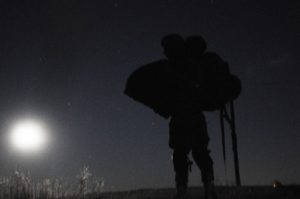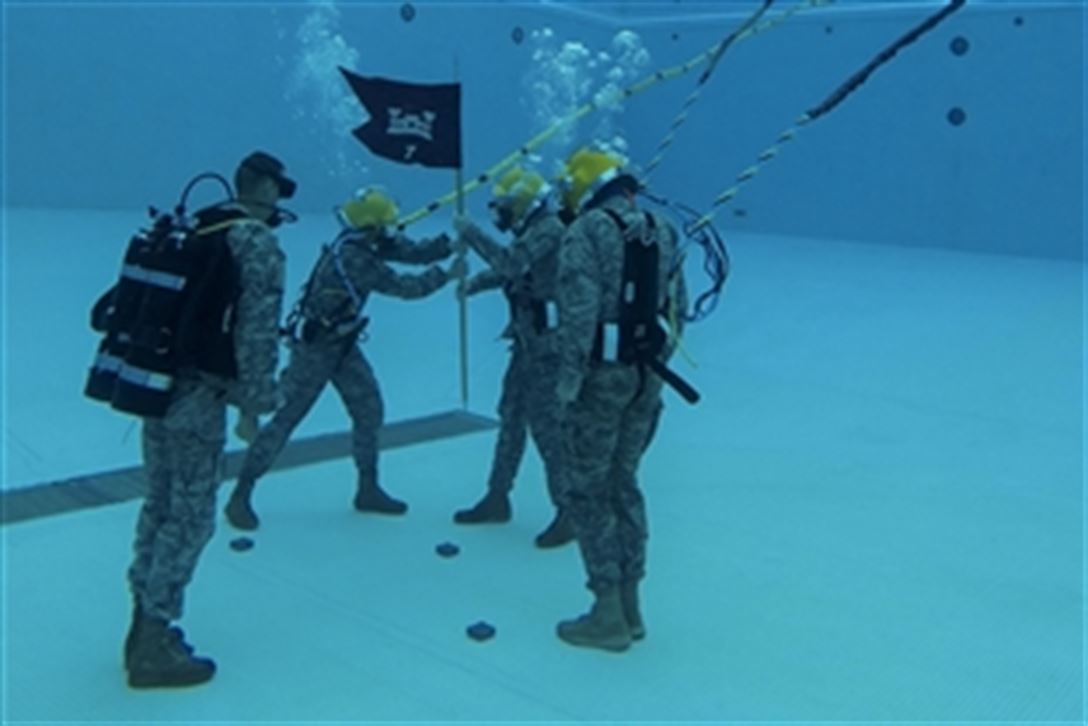
In late 1999, at Fort Bragg, North Carolina, I jumped out of an airplane in the fog.
Through the quirks of assignments during a 22 year Army career, I’ve only had the pleasure of two Airborne assignments out of eight or nine different ones. Those two were three years as a paratrooper with the 82nd in the late 90s, and the last years of my career in the 10th Special Forces Group support element. Throughout those two assignments, I conducted something like 35 or 36 jumps. To be honest, nearing retirement, I lost count, and my 35 jumps are nowhere near the number of many career-long paratroopers. Many of those jumps blur together, but this was one that still sticks with me to this day.
I don’t remember the exact date, although I know it was sometime in the fall. We knew that the weather conditions were going to be less than ideal, because we had been briefed that the aircraft pilots were going to be using the Adverse Weather Aerial Delivery System (AWADS), a system that allows the pilots to know when to release personnel, equipment, and supplies during weather conditions that preclude visual confirmation of release points on the ground.
This jump was memorable because it was unlike any jump that I had ever made before, or any jump I made after that. When I exited the aircraft, there were several things I could remember. First, total and absolute silence, almost a complete peace. I felt as if I were the only paratrooper in the air, which is a hard feat to accomplish after exiting a C130…usually the entire sky around you is filled with your fellow airborne brethren. Second, near zero visibility. I could see my parachute above me as a round shadow, and the ground below me as an even larger shadow. Third, the air around me seemed to be glowing, thanks to the full moon that could barely be seen as a bright disk somewhere up ahead. Coupled with the fact that we were released at a much higher altitude than our typical 800 feet above ground level, and I felt as though I was floating through a surreal dreamworld forever. Of course, the landing still had to happen.
As I was talking to a veteran the other day about this experience, I realized that this experience could be correlated to transitioning out of the military. Typically, most veterans only do this once; the exceptions, of course, are those who got out, came back in, and left the service again, but for the majority of veterans I work with, once was enough.
We jumped out of the airplane, you and I. Whether we were ready for it or not, whether our heart, our mind, or our finances were in the right place, we still jumped. One of the first things I realized when I transitioned was how strangely alone I felt. The airplane kept flying…the Army kept going. As I was heading towards my retirement, I was talking to my company leadership about needing to take some time to transition, and they said, “no problem, take all the time you need.”
“Wait a minute,” I said, “I do a lot of stuff around here, I need to make sure that things are handed off the right way.”
“You’re right, you sure do…and it will either happen or not happen when you leave. We’ll figure it out.”
As on that fall night over Sicily Drop Zone, I felt alone. Didn’t seem like there was anyone else in the air around me. Our TAP class at Fort Carson had a wide range of Soliders attending, from junior enlisted soldiers to Senior NCOs and Officers. Each of us had different goals, different agendas, different ideas about what was coming next…and each of us felt as though we were in the sky by ourselves.
Like on that jump, I was entering into unknown territory. I had zero visibility; I was jumping into a fog. I knew nothing about resumes, interviews, dressing for success; even figuring out how to transition to bi-weekly paychecks rather than twice a month was a challenge. I had my intended career path, as I was already a year and a half into my Master’s Degree, but I had no clue how I was going to bridge the gap between retirement and graduation.
However, both with the jump and with transition, there was one inevitable thing: regardless of how alone or connected I felt, or how much visibility I had, I was going to land sooner or later. I was going to hit the ground, I was going to be out of the military. Once I hit the ground, it was my choice to lay there and wait for something to happen, or get up and make something happen. Everything began and ended with my own choice.
All of this is about our outlook. Our mindset. I could have been scared out of my wits that night, and (to tell you the truth) there was a bit of fear there. My excitement, however, my outlook, had a lot to do with overcoming that fear. I trusted in my equipment. I trusted in the professionals that helped me prepare that equipment. I trusted the pilots that released us over the correct drop zone. I found myself with moments of doubt during my transition, as well. I trusted my equipment there, as well; I followed the advice of those who had jumped out of the plane before me, and made my own luck happen where luck didn’t seem to be around much.
If you find yourself struggling in your transition, remind yourself: I’m not alone in the sky. Even though I have zero visibility, I trust in my equipment.
And it’s been one hell of a ride.



